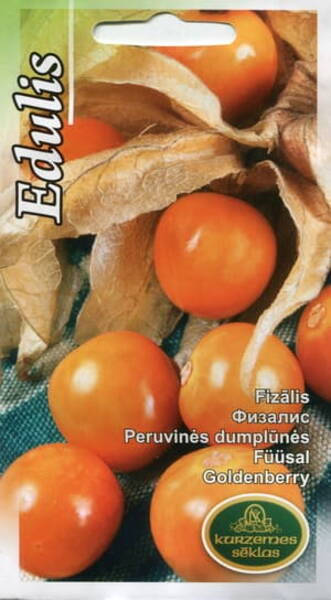They are grown in the same way as tomatoes: seedlings are planted in open ground after the end of spring frosts.
Physalis berries contain vitamins A, B, C and have valuable medicinal properties.
In 1 gram = 500-600 seeds.
* For medicinal purposes, the fruits, fruit juice, and roots of Physalis are used.
Alkaloids have been found in the roots.
The leaves contain carotenoids; steroids; phenolcarboxylic acids; flavonoids.
The fruits contain sugars, pectin; organic acids, carotenoids, and the seeds contain fatty oil, ascorbic acid, tannins, macro- and microelements + carotene.
The fruits have anti-inflammatory, antiseptic, analgesic, hemostatic, diuretic, and choleretic effects.
Decoctions or aqueous infusions of the fruits are taken for urolithiasis, cystitis, hepatitis, bronchitis, intermittent fever, edema, ascites, rheumatism, gout, and bruises.
Fresh fruits and juice are used for dermatoses, respiratory diseases, gonorrhea, dysentery, and hypertension.
Decoctions of the roots are recommended in folk medicine as antitussive, analgesic, and useful for stopping menstruation.
Physalis fruits are used in the treatment of anemia, hypertension; recommended for elderly people suffering from constipation (fresh fruits – 5–10 pieces 2–3 times a day before meals).
For patients with hypertension, tea made from dried leaves and fruit husks of Physalis is beneficial.
Ointment made from Physalis fruits is applied externally for inflammatory processes, as a pain reliever, for rheumatic and gouty pains, and also as a wound-healing agent that enhances tissue regeneration.
! It is necessary to remember that the aerial parts of Physalis and the fruit husks contain alkaloids and physalin, which are considered toxic, and therefore their use as a medicinal remedy at home is strictly prohibited.















